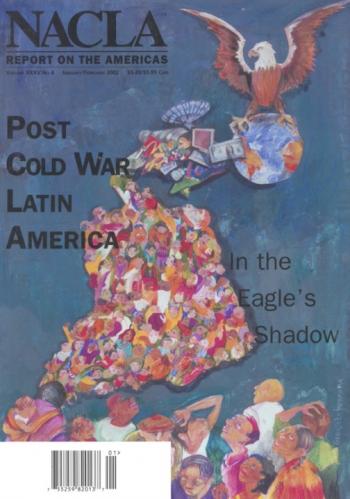Report
The historical period that began with the fall of the Soviet Union and the advent of the United States as the world’s only superpower changed Brazil’s international position. Up until then, Brazil had been one of the so-called “emerging intermediate powers.”
Peruvians are just beginning to untangle the web of high-level corruption woven during Alberto Fujimori’s presidency. Fujimori was first elected in 1990; in April, 1992, in what has been referred to as the autogolpe or “self-coup,” he suspended the Constitution and dissolved the Congress; a new Congress beholden to him rubber-stamped authoritarian measures said to be aimed at stopping terrorism and reforming an economy near collapse.
Colombia has been wracked by civil war for 37 years and today the nation is at a crossroads: Either it will close off the possibility of ending the current conflict through negotiations, or it will succeed in bringing peace negotiations to a successful conclusion.
The U.S. plan to create the Free Trade Area of the Americas (FTAA) as a hemisphere-wide successor to, and expansion of the North America Free Trade Agreement (NAFTA) is a strategic project aimed at consolidating U.S. supremacy in the region by means of increased U.S. exports, more investment controls and sophisticated financial-flow monitoring methods.
The persistent conflict between the United States and Cuba seems to be an exception to historian Eric Hobsbawm’s concept of the twentieth century as a “short century” that ended prematurely with the collapse of the Berlin Wall in 1989. In terms of this conflict, the century is not yet over, since the Cold War between the United States and Cuba has not finished.
When Mexico’s President Vicente Fox paid a visit to the White House and the U.S. Congress last September, he spoke to a group of Washington insiders about the institution that has become the symbolic embodiment of the “new relationship” between Mexico and the United States: the North American Free Trade Agreement (NAFTA).
John Lear & Joseph Collins
In the fall of 2000, a theater in Santiago’s Bellavista district featured the play Con Flores Amarillas, the story of a computer hacker who breaks into the accounts of Chile’s big banks to send checks to the poor, to Mapuche Indians—and to retirees.
As foreign reporters descended upon Managua during the runup to last fall’s presidential election between Sandinista leader Daniel Ortega and ex-Contra Enrique Bolaños, their favorite question was: “Has Daniel Ortega changed”?

